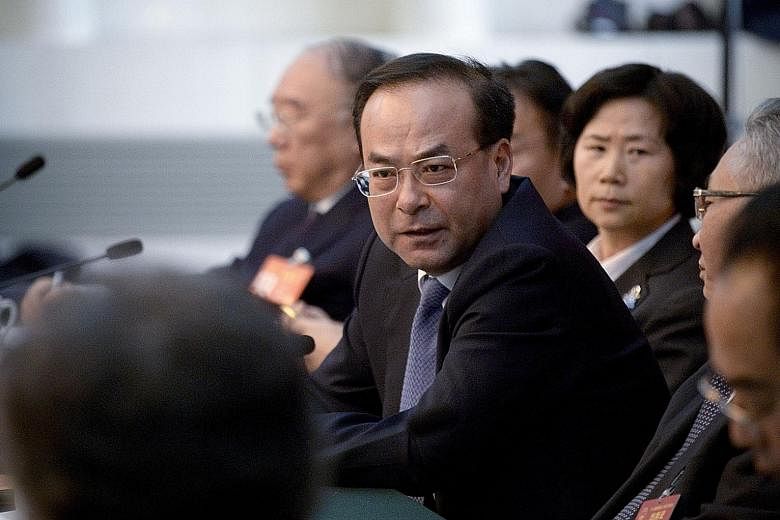BEIJING • China will expand a pilot project for anti-graft supervision reforms nationwide next year that will consolidate existing corruption agencies, as President Xi Jinping expands his signature policy drive.
China's top legislature last Saturday adopted a decision calling for new supervisory commissions to be set up by the people's congresses at the provincial, city and county levels to "supervise those exercising public power".
The move builds on a pilot project launched in Beijing and the provinces of Shanxi and Zhejiang in January.
The commissions will have the power to investigate illegal activities such as graft, misuse of authority, neglect of duty and wasting public funds.
They will have the ability to conduct searches, freeze assets and detain suspects as part of those efforts.
Mr Xi's signature anti-graft drive has jailed or otherwise punished nearly 1.4 million Communist Party members since 2012.
The latest big name to fall was Mr Sun Zhengcai, once considered a contender for the top leadership.
Mr Sun was abruptly removed from his post as Chongqing party chief in July and, in September, the party announced he would be prosecuted for leaking secrets, bribery and abusing his power.
Mr Xi, who began his second five-year term last month, has vowed to maintain the "irreversible" momentum of the campaign to root out corruption.
-
1.4 million Number of Communist Party members Mr Xi Jinping's anti-graft drive has jailed or punished since 2012.
China aims to pass a national supervision law and set up a new commission at the annual Parliament meetings early next year.
The new National Supervision Commission will work with the Communist Party's anti-graft body, the Central Commission for Discipline Inspection, expanding the purview of Mr Xi's anti-graft campaign to include employees at state-backed institutions.
The drive to clamp down on corruption might be bad for profits at upscale restaurants and casinos, but ultimately it is going to help the nation's economy, a recent study claims.
The campaign stands to improve the allocation of resources and help small companies - the backbone of the entrepreneurial economy - obtain easier access to finance, according to the research led by finance professor Mariassunta Giannetti of the Stockholm School of Economics.
The research found the amount that large companies spent on meals and gifts to attract the favour of government officials - commonly detailed in an accounting line known as "entertainment expenses" in China - plummeted as a ratio of their sales in the two years after the campaign began.
In turn, that has helped smaller companies without deep slush funds compete on a more even basis, according to the research.
"Small firms are more profitable and productive when their large peers spend less on entertainment expenses in proportion to their sales, because they are able to increase their sales, invest more and have cheaper funding," the researchers wrote in the paper.
"This anti-corruption drive has been considered the most far-reaching and lasting than any previous attempts."
However, smaller firms might have taken up some of the habits of their bigger competitors.
While large enterprises curbed their entertainment spending after 2012, small companies did just the opposite.
REUTERS, XINHUA, BLOOMBERG

